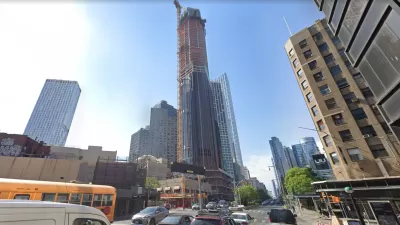Doug Henwood explains how "elite bodies", rather than pure "market forces", guide the growth of New York City. He begins his story with the Regional Plan Association's influential 1929 plan and focuses on the transformation of Downtown Brooklyn.
"Anyone walking around New York City, visitor or resident, might think the place had been laid out by the chaotic mind of the market," writes Henwood. "In fact, the place has been planned over the last century by monied interests, first among them the real estate developers who build and own the results of the plans, in tight alliance with local government."
"All this is done through a powerful combination of inducements: money, tax breaks, zoning changes and, if all else fails, eminent domain."
"It would be nice if the whole process were opened up and made subject to democratic planning. Plenty of community-based plans have been done for the city, as Tom Angotti shows in his book New York for Sale, but they’re almost always ignored in favor of the elite kind."
FULL STORY: How the 1 Percent Rules

Maui's Vacation Rental Debate Turns Ugly
Verbal attacks, misinformation campaigns and fistfights plague a high-stakes debate to convert thousands of vacation rentals into long-term housing.

Planetizen Federal Action Tracker
A weekly monitor of how Trump’s orders and actions are impacting planners and planning in America.

San Francisco Suspends Traffic Calming Amidst Record Deaths
Citing “a challenging fiscal landscape,” the city will cease the program on the heels of 42 traffic deaths, including 24 pedestrians.

Defunct Pittsburgh Power Plant to Become Residential Tower
A decommissioned steam heat plant will be redeveloped into almost 100 affordable housing units.

Trump Prompts Restructuring of Transportation Research Board in “Unprecedented Overreach”
The TRB has eliminated more than half of its committees including those focused on climate, equity, and cities.

Amtrak Rolls Out New Orleans to Alabama “Mardi Gras” Train
The new service will operate morning and evening departures between Mobile and New Orleans.
Urban Design for Planners 1: Software Tools
This six-course series explores essential urban design concepts using open source software and equips planners with the tools they need to participate fully in the urban design process.
Planning for Universal Design
Learn the tools for implementing Universal Design in planning regulations.
Heyer Gruel & Associates PA
JM Goldson LLC
Custer County Colorado
City of Camden Redevelopment Agency
City of Astoria
Transportation Research & Education Center (TREC) at Portland State University
Jefferson Parish Government
Camden Redevelopment Agency
City of Claremont





























